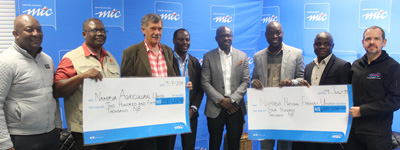
Mentorship programe to help Ovitoto farmers

Mentor to the farmers in Ovitoto, Israel Hukura (Photoraph by Hilma Hashange)
The mentorship project is an initiative of the Farmers Support Project (FSP) and is sponsored by the GIZ, a German Develeopment Agency in Namibia and Agribank. The country wide project started in 2011 and targets communal, commercial and settlement farmers.
The mentoring programme involves offering support to the farmers and encouraging them to maximize their production potential, develop their skills, improve their performance and become the people they want to be. The Farmers Support Project (FSP) currently has 18 mentors contracted on a part-time basis to assist farmers on a day-to-day basis on their farms.
According to Israel Hukura, the mentor stationed in Ovitoto, the idea of implementing a mentorship programme grew from the realisation that farmers in the area lack the required skills and knowledge to properly manage their livestock. “The aim of the mentorship is to assist livestock farmers with the necessary skills that will enable them to uplift their standards in the farming sector, “ said Hukura.
Ovitoto, a communal area situated approximately 45 kilometres South-East of Okahandja, comprises 19 settlement areas or villages and borders several commercial farms. Hukura says that the idea of mentoring came from the farmers themselves as they identified various challenges that they faced during their farming activities. “The farmers invite us to their homes where we have one on one mentoring sessions. We listen to their grievances and then we offer them our profesional advice for free,” said Hukura, who is occassionally accompanied by two animal experts.
The Farmers Support Project (FSP) holds farmers’ and information day where the farmers from Ovitoto and the surrounding areas are invited to attend and listen to motivational speeches by various invited guests who are usually experts in the farming sector. “At these meetings, we provide the farmers with booklets that cover various topics regading the farming industry such as the type of vaccination given to cattle and so forth. We also offer them feedback on inquiries that they might have asked on previous occassions,” Hukura said.
Hukura, a farmer himself from Ovitoto, said that gaining the trust of his fellow farmes is important before offering any advice or mentoring them since many of the farmers are tradition-bound and are not often willing to listen to new modern ideas. He says that the language barrier is also a problem as the booklets are all written in English and thus require translating the materials into the venacular language.
“Quite often you meet some farmers who cannot read and therefore it is your responsibility as a mentor to try and explain the information given in the booklets to the farmers. Also, providing the farmers with modern ways of farming is vital as many of the farmers are accustomed to traditional ways of farming and unless you convince them, they will not take your advice,” he said.
“However, many farmers are willing to listen to advice and are involved in the mentoring process hands on. Farmers now want to diversify hence we take a few of them to various sessions at different farms in order for them to experience other means of farming. They realised that farming is a business and they are willing to take care of the wellbeing of their animals and adhere to the exportation laws especially because Namibia exports meat to other countries,” Hukura elaborated. Hukura is currently in Windhoek hunting for presenters at the next farmers’ and information day to be scheduled soon.
The management of rangeland has always been acknowledged as a very important precondition for the sustainable livestock production system within the Ovitoto area.Many settlements in the area are remote and surrounded by rugged and mountainous terrain.
In 2009, members of the Kambekura Farmers Association in Ovitoto, through the Country Pilot Partnership for Integrated Sustainable Land Management (CPP-ISLM), received a total grant of N$ 249,973 from the Innovative Grants Mechanisms with the aim of supporting them to manage their livestock herds and rangeland resources in such a way to reduce their vulnerability to climate variation and improve their income from livestock sales.
The objective of the project was to equip the farmers with the necessary skills to enable them to apply livestock and rangeland management practices, such as improved livestock breeding and husbandry practice and also to link them to appropriate markets for their livestock.
A total of 358 farmers, including 51 women received training through the project, with some being trained for local level monitoring.
Although farmers were introduced to herding as part of a planned grazing system and a marketing innovation platform was established to create private and public partnerships, lack of land ownership led to farmers not commiting easily to the conditions of a land management plan. Also, farmers lack the appropriate skills and knowledge on rangeland management because the available knowledge is based on commercial farming systems which is often not suitable for the communal farmers of which Ovitoto is a prime example.













































